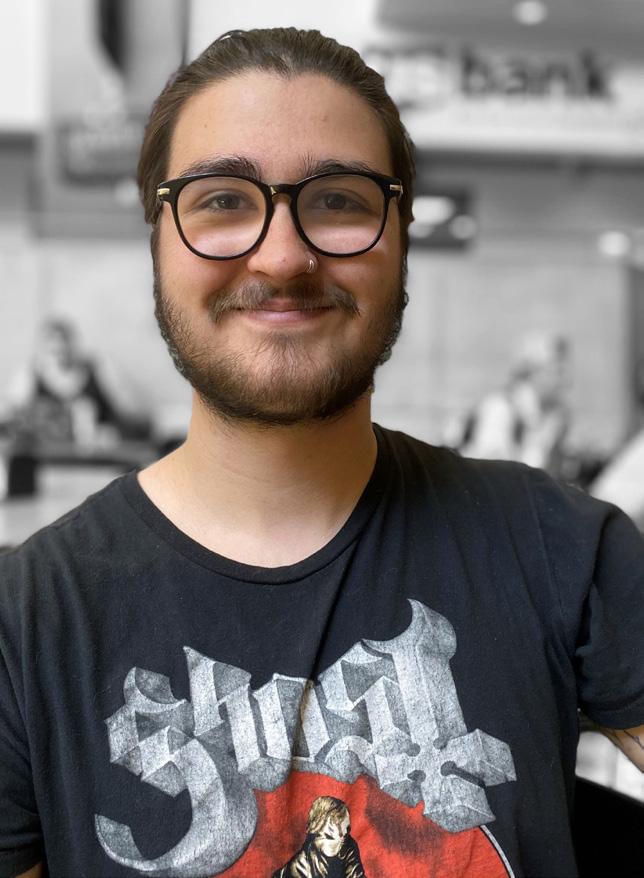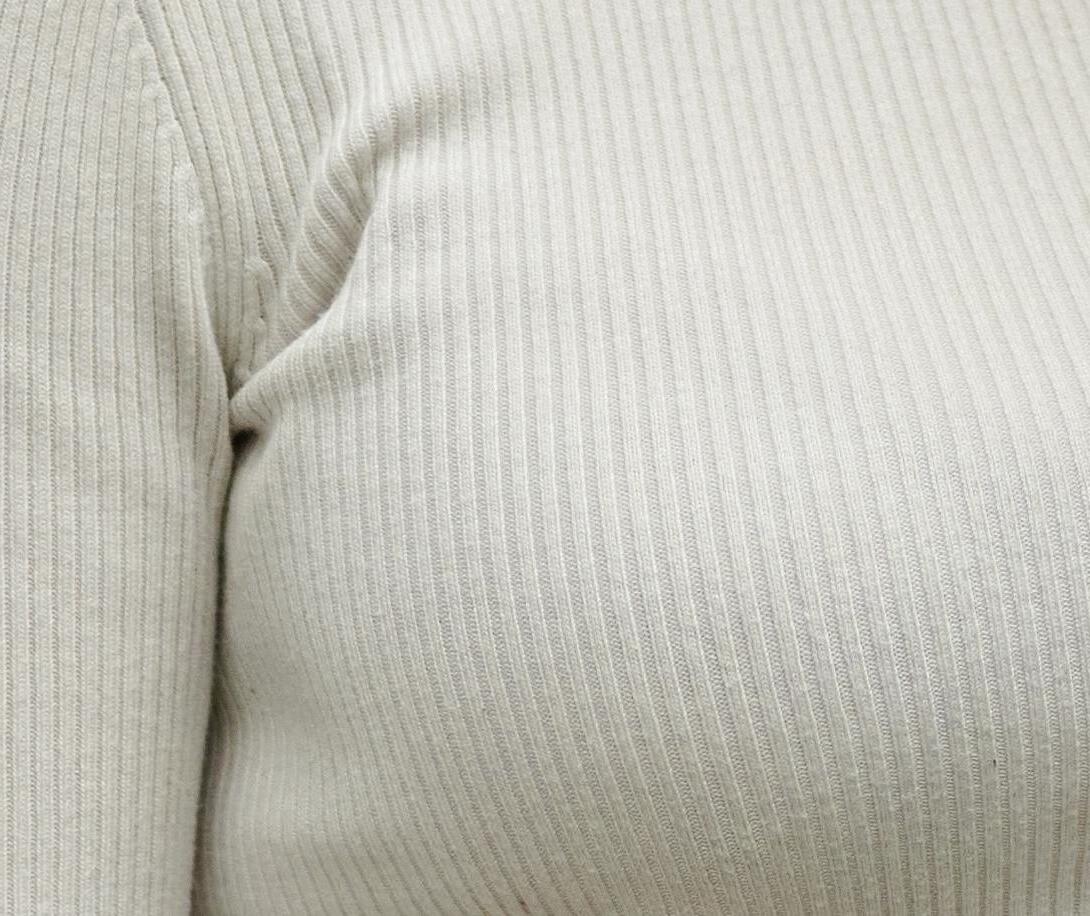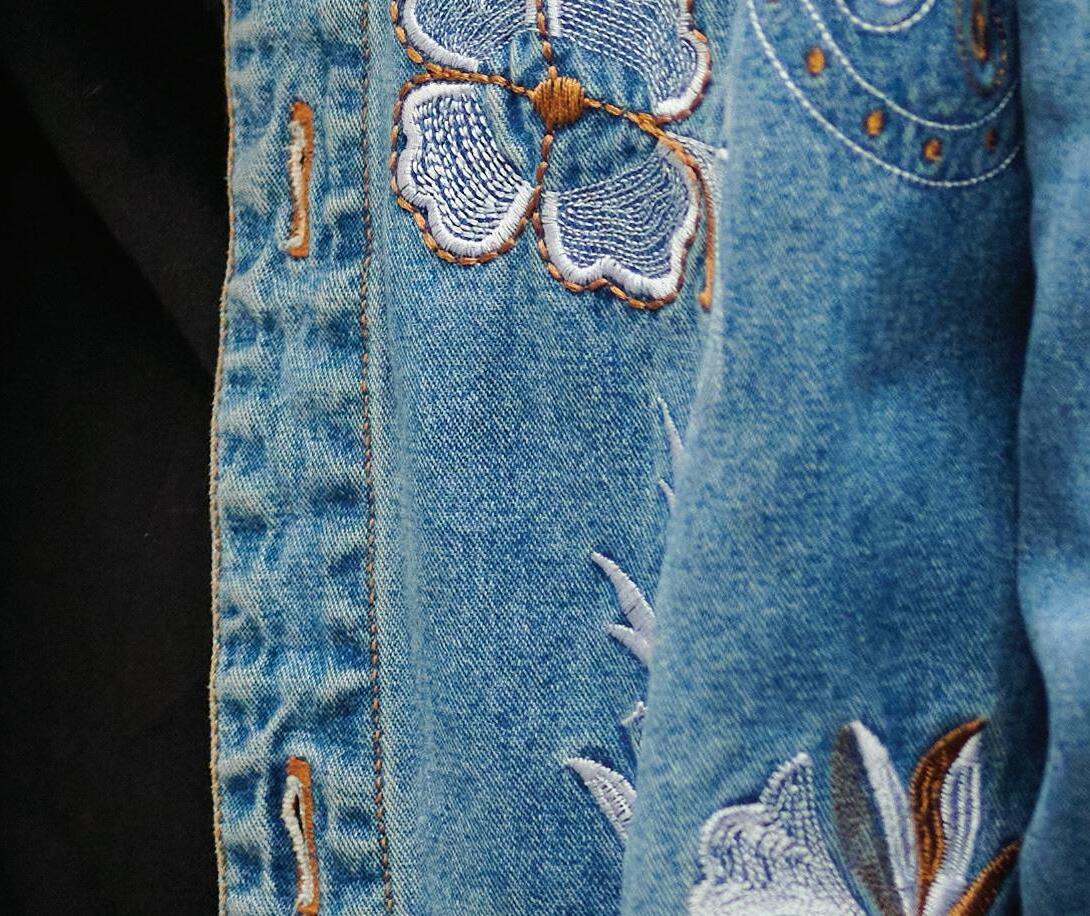
See Pages 4 - 5

Letter to president addresses disgruntled staff
See Page 6
By the students, for the students



See Pages 4 - 5

Letter to president addresses disgruntled staff
See Page 6

As the war between Israel and Palestine rages on with more than 30,000 Palestinians killed and over 100 Israeli hostages still being held in Gaza according to Al Jazeera, college campuses, including CWU, seem to be locations of growing tension. After Vanderbilt University students created a pro-Palestinian solidarity encampment on campus grounds at the end of March, calling for disclosure and divestment from Israeli entities, universities across the globe have followed in their footsteps, sparking the largest student protests since the Vietnam War according to NPR. Hitting close to home, the University of Washington (UW) began an encampment at the end of April seeking disclosure and divestment from UW administration, amid calls to divest from UW’s long-time partner, Boeing.
With all this upheaval in the backdrop, curiosity has risen amongst the CWU body concerning CWU’s ties with Israel. The Observer investigated this claim, and the findings suggest that CWU does have ties to Israel. These findings include CWU receiving grant money from Boeing through CWU’s foundation, the fact that Ray Conner, a member of CWU’s Board of Trustees (BOT) has current and former ties to companies with explicit connections to Israel and the fact that CWU’s
pension fund is managed through Fidelity, a company that also has ties to Israel and the ongoing war.
Joel Klucking, the treasurer of the BOT acknowledged CWU’s ties to Boeing through CWU’s Foundation, an independent but University-affiliated nonprofit corporation aimed at supporting CWU. “[CWU does] solicit lots of corporations for our foundation… and Boeing is one of them,” Klucking said.
Boeing is one of the major companies activists are currently calling to divest from. According to the Boycott, Divest and Sanction (BDS) movement Boeing is “a company that has actively manufactured and sold weapons, which have been used in direct attacks on Palestinian civilians, a violation of international humanitarian law and human rights.”
While Boeing is a large corporation that is made up of many divisions, the specific division that is responsible for weapons manufacturing is Boeing, Defense and Security.
NPR news reported that “from 2021 to the end of 2023, the U.S. delivered an estimated 5,214 missiles to Israel—nearly 3,000 of which were Boeing’s GBU-39 Small Diameter Bombs.”
In addition to Boeing’s support to CWU’s Foundation, CWU’s connections to Israel can be found in CWU’s BOT. As one of eight of CWU’s trustees, Ray Conner is a part of “the

governing body of the university and works closely with President Wohlpart,” according to CWU’s website. Conner served as the vice chairman of The Boeing Company from 2013 to 2017. From 2012 to 2016, Conner was the CEO of Boeing Commercial Airplanes and from 2008 to 2011 he was the vice president and general manager of Supply Chain Management and Operations for The Boeing Company.
According to CWU’s website, Conner “worked for Boeing for more than 40 years, starting out as a mechanic and steadily climbing through the ranks of company leadership.”
Currently, Conner serves as an Operation Advisor for Clayton, Dubilier and Rice, a private equity firm that manages the assets of a wide range of businesses, which also have been under scrutiny for their ties to Israel, the occupation and the war.
Clayton, Dubilier and Rice is a company that in 2022 “brought more than 300 Israeli and global senior industry professionals, including leading Israeli limited partners, global fund managers and advisors to discuss a range of critical topics and trends influencing private market investment activity,” according to the Clayton, Dubilier and Rice website. “The backdrop of the conference, which was held in Tel Aviv, is the record level of private capital allocations by institutional investors in Israel.”
When reached out to for comment, Conner’s team told The Observer that he would not be able to participate for comment.
In addition to these ties, as stated by CWU’s website, “With the CWU Retirement Plan (CWURP) [pension fund], each dollar contributed is fully matched by Central, and funds may be selected with the help of Fidelity Investments, the nation’s largest investment management firm and provider of workplace retirement plans.”
But, how exactly does Fidelity have ties to Israel and the ongoing war? According to feminist anti-war grassroots organization, Code Pink, “as one of Airbnb’s main investors, Fidelity has an opportunity to use its unique position of influence to ensure that the company abides by its human rights obligations under international law.”
According to Code Pink, as Airbnb allows “users to list and rent properties in illegal Israeli settlements and by taking a 9-15% fee from hosts and guests, Airbnb is not [only] profiting off of Israel’s continued occupation of Palestinian land, but also helping facilitate settlement activity.”

On May 8, CWU President Jim Wohlpart sent out an email with an update on the search for a Vice President for Equity and Belonging and Senior Diversity Officer. After the failed search, the president, along with members of the Vice President of Equity and Belonging search committee, shared governance leaders and the members of the Executive Leadership Team decided to hire Dr. Charlita Shelton as the interim vice president of equity and belonging and senior diversity officer. Arriving June 10, her contract is for 18 to 24 months.
Highlighting Shelton’s experience in his email, Wohlpart included her current position as chief of staff to the President of Gonzaga University and her previous experience as an interim associate chief diversity officer, a board member of the Colleges of Law, Santa Barbara/Ventura, LGBTQ+ Presidents
in Higher Education and Genovate Institutional Advisory Board in West Yorkshire, United Kingdom.
She also has several published works on structural inequality, social justice, first-generation African American college student completion, women in leadership and institutional climate, as well as many other accolades.
As well as Shelton, Verónica Gómez-Vilchis has been hired as the inaugural associate vice president of equity and belonging in Student Engagement and Success. Starting June 1, Gómez-Vilchis has served CWU for the past couple of months as the interim director of Student Leadership, Involvement and Community Engagement (SLICE). Gómez-Vilchis has been with CWU for nearly 20 years, working in a variety of positions related to
diversity and equity. She has also played a large role in moving CWU towards being a Hispanic-Serving Institution.

Mariana Bravo’s major was incorrectly written as political science and law & justice; she is a Business Administration major. (Page 5)
Dylan Santini’s major was wrongfully noted as clinical psychology; he is a student of clinical physiology. (Page 8)

First thing’s first: thank you to my incredible staff for their work on Monday evening design night while I was in Seattle. My trip to SIFF went swimmingly (for the most part) and I am so thankful for the school and my staff for allowing me to take this chance to leap head-first into my future. Stories about those movies coming soon!
Next! Thanks to everyone who wrote a story this week! We’re back at 16 pages and STILL don’t have enough room for everything! This has been an incredible quarter for the newspaper, and it’s entirely in part to the incredible stories that my editors and writers have been producing each and every week. This might be one of the strongest issues that we’ve ever printed, and I’m so proud of my staff.
Short letter this week. It’s been a long — but thrilling and necessary — few days. I’m excited about this issue. I’m excited about the future of the paper. I’m excited about the future of CWU.
Until next week, Isaac Hello,


Fidelity Charitable, a public charity that has helped donors support non-profit organizations, has also been met with backlash from pro-Palestinian movements and organizations both for its investment in Israel and for removing funding to the United Nations and Relief and Works Agency for Palestine Refugees (UNRWA).
UNRWA’s website indicated that the agency was created in 1949 and that ”in the absence of a solution to the Palestine refugee problem, the General Assembly has repeatedly renewed UNRWA’s mandate.” “[The agency] has contributed to the welfare and human development of four generations of Palestine refugees ... Today, some 5.9 million Palestine refugees are eligible for UNRWA services.”
According to Rolling Stone, “Fidelity Charitable removal of UNRWA’s U.S. arm from its platform follows the suspension of approximately $450 million in funding to the relief organization from 16 countries following Israel’s allegations that a handful of its workers were involved in the events of Oct. 7.”
CONTINUED FROM PAGE 1
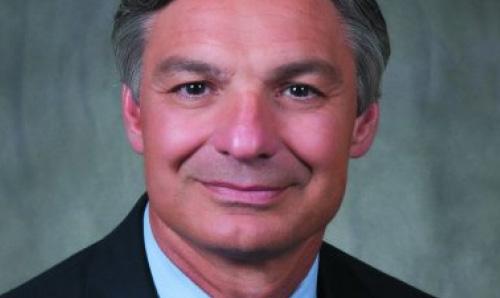

CWU’s pension fund being through Fidelity doesn’t sit right with Gilberto Garcia, a professor in the Political Science department. “I think anything to do with Israel’s economy and if they’re [CWU] invested in it, then yeah, I’d say that they’re being complicit to genocide.”
Bernadette Jungblut, a professor in the political science department at CWU, commented on the university’s ties to Israel. “I think a lot of folks… focus on the stuff that’s right in front of us,” Jungblut said. “We teach our classes, we go to class, we go to our jobs, we just work and I’m not sure how many people are really aware of the environmental, social and governance concerns in terms of where we get our money from, and how our money is invested … You can’t bring about change if you’re unaware of things that you might want to see changed … [if people] are unaware of these issues, you’re not gonna see them protesting.”
“I think anything to do with Israel’s economy and if they’re [CWU] invested in it, then yeah, I’d say that they’re being complicit to genocide.”- Gilberto Garcia



In the Equipment Circulation Center (ECC) in Lind Hall, film students linger, talk about their upcoming projects and check out cameras, tripods and microphones from senior film major Michael Boyer. Recently 22, Boyer is the lone employee at the ECC, and more often than not has to turn away his peers from equipment that would normally be available to them, and give them subpart equipment.
“I’ve had to turn away so many prod three students for equipment because I’m just reserving boom poles for prod six people,” Boyer said. “That should not be the case. When I was in prod three, I was able to get boom poles, and other students in the past were able to get boom poles.”
For context, the film program has six core classes to take: Production classes which students will refer to as “prod one,” “prod two” where students begin to develop their skills and onward up to “prod six,” where students make their thesis film. Right now, Boyer has to make the call on his own which production teams get which equipment, and with three currently broken boom poles out of seven — which are used to record audio — there’s not much wealth to go around.
Boyer said that he has had to give lesser equipment to four prod three groups this quarter. In a class with three people per group, that’s 12 future filmmakers without the means to hone their skills.
Filled to the brim with equipment stamped with sticky notes denoting their damage and unwalkable due to zero floor space, Lind Hall 118H is dedicated to storage of the film program’s equipment, both broken and usable, which Boyer says makes things more complicated than they need to be. Boyer estimates that about 90% of the equipment here is broken. The storage room was moved to 118H from 118G, which Boyer says is much bigger, and allowed for much easier access to the old equipment.
“I don’t know [why we keep it around],” Boyer said. “I feel like there was a system that we followed before this that made sense … some of these [notes] are very specific, like ‘weird crackling noise, got it,’ but then this one is like ‘out of service.’ What is that supposed to mean? Is it something that we can fix? We’re not really told to throw away anything, just label it.”


Boyer said that there was an instance where working black flags — which are used to block out the sun for the camera — were just sitting in the storage room. He put them back in the ECC after he found them.
Yohannes Goodell, a senior film major, said that when equipment does come back broken, it’s more often than not due to tenured usage rather than student error.
“A lot of the equipment we have … is under constant use and constant wear,” Goodell said. “Stuff breaks … the boom equipment, which is like our sound equipment for the sound pole, we checked that out thinking that it was okay, then during the shoot [there was] a huge rattling noise and the top of the mic kept coming on and off, so we had to jerry-rig it to make it work.”
When equipment does come back broken, there is nobody on campus trained to fix it. And despite protocol, there is nowhere to bring it to get repaired.
“I’m technically supposed to take [equipment] away and repair it, but I have not been trained on how to repair equipment,” Boyer said. “We don’t have anybody to repair equipment … If it’s broken, I can’t do anything about it. Or if it’s something that’s slightly broken but could still work … for budget sake, I have to keep it in.”
Another issue that film students at CWU face is the lack of cameras designated specifically for filmmaking. When the CWU film club hosts their quarterly 72-hour film bash, where club members have exactly three days to put together a short film, the ECC is barren, with quality cameras being the most sought-after and least available asset.
“There was nothing,” Boyer said. “No cameras, no lights, all the batteries were gone, all the C-stands were gone … Everything was gone. I had to say ‘Oh, you can use the Nikons.’ … That’s the thing, we have mostly Nikon cameras and Nikon cameras are photography cameras … A lot of times students don’t want them and I understand because a lot of them are older Nikons too. This equipment is pretty old, maybe like six years old, maybe older than that.”
Many students felt like they had been manipulated in their choice to attend CWU for the film program. Boyer said that the photos on the department’s website page are a decade old. Some photos include RED cameras, which are the industry standard and not available at the ECC.
“They lied to us,” Yami Rodriguez, a junior film major, said. “They promised us RED cameras and when I got here they had none.”
Boyer also believed that the website is misleading to prospective students. The department website touts CWU’s film program as one that will “prioritize providing you with a hands-on approach to film education, where you will have access to modern equipment and experienced mentors who are passionate about the art of filmmaking.” This is a far cry from the reality many film students are facing.
“I don’t want to sound like we’re whining and want money,” Boyer said. “But when you market yourself as a film school, and that you’re providing that opportunity for people, you’re basically scamming people.”
Despite a lack of proper equipment and false advertising for the department, film students have high praise for their professors, including Professors Phan Tran and Michael Caldwell, who have done well in preparing them to enter the film industry.
“Caldwell right now in prod one has been teaching them how to use a camera, how to use all the equipment itself,” Sophomore film major Javier Angulo said. “Which is really good because it shows that there are professors here who really do care and want you to get the experience … I was thinking of leaving in the winter quarter, but thanks to Phan for actually teaching me something in winter quarter, I stayed for the spring. Big shout out to Phan.”
Senior film major Lindsie Avalos echoed Angulo’s praise of Caldwell and Tran as well as shouting out Professor Jason Tucholke. She also alluded to the importance of the professors in their choice to attend CWU.
“I’d say our professors really try,” Avalos said. “That’s the one good thing about our program is our professors. Jason [Tucholke]’s awesome, Caldwell’s awesome, Phan’s awesome. We have really strong professors that actually care about us and that really keeps us going. If it weren’t for them, I think most people would have dropped. I really do think so.”
Many of the film students thanked Tran for his generosity in buying equipment for them out of his own pocket, and in some cases even lending out his own personal equipment.
“He’s helped out a lot to allow us to make something that we are actually proud of,” Boyer said. “We can make good art. There are really talented people here, and if they just get equipment like [Tran’s], or even more advanced equipment, we could make some really cool stuff here. It just sucks that a lot of this shit is either broken, old or outdated.”
Boyer expressed love for a professor who has since departed from the program named Justin Daering, who he said made himself available to every student in the department. Even those whom he didn’t have classes with.
“He fought for us, and for the students,” Cirillo said. “He made an effort to learn everyone’s names. I never had a class with him and was in the ECC one time and he comes up to me and introduces himself. He’s like ‘I’m Justin, what’s your name? Nice to meet you, welcome to the film program.’ He was such a caring teacher, and again it was just this one interaction that I had with him this one time I met him, and I could tell immediately he cared about every one of his students.”
Daering stopped teaching at CWU in the spring of 2022. Amongst the film program runs a widely subscribed to theory that he was let go due to his pressure on administration to support the film program.
“In spring 2022 it was announced that he was going to be not returning anymore,” Boyer said. “It’s basically theorized that he was let go because of how much he was actually fighting for the film program. And the school didn’t like him speaking his mouth, and they let him go. They didn’t fire him, they just didn’t renew his contract because he was very outspoken on the treatment of the film program.”
Avalos toured the film department in the spring of 2019 before the COVID-19 pandemic. According to her, the program seemed to be alive and thriving at the time, not like it is now.
“This place was really packed with film students,” Avalos said. “It was alive, and I think COVID definitely was a big part of ruining the film program. It really struck it down. I’ve heard [Professor Michael] Caldwell say the same thing. There was a film club and then it just died, and then the film club was reborn in my junior year.”
Boyer recapitulated her sentiment, describing Lind Hall as “feel[ing] like the skeleton of something that used to be really great.”
Beyond the damaged and old equipment, other issues remain. Namely, a lack of in-person professors and the content of these remote classes. Angulo said that during his first year, his prod one class was only available online.
One recent assignment posted on Canvas by a remote professor for an editing class was titled “Crisis on Campus Editing Documentary assignment.” This assignment required students to edit together footage from a 17-minute video of a faux school shooting. The video opens up with young adults running away from their campus and being shot by a man on the roof, without a content warning.
“I literally said ‘Oh my god’ audibly,” Boyer said. “I thought I was watching people actually get shot … I’m personally okay with watching that content, but there was no content warning. It didn’t say what it was. It was just called ‘Crisis on Campus,’ and that could mean anything.”
“We had to do research on it to make sure it was fake,” Rodriguez said. “[They] gave us not even a week, like a few days.”
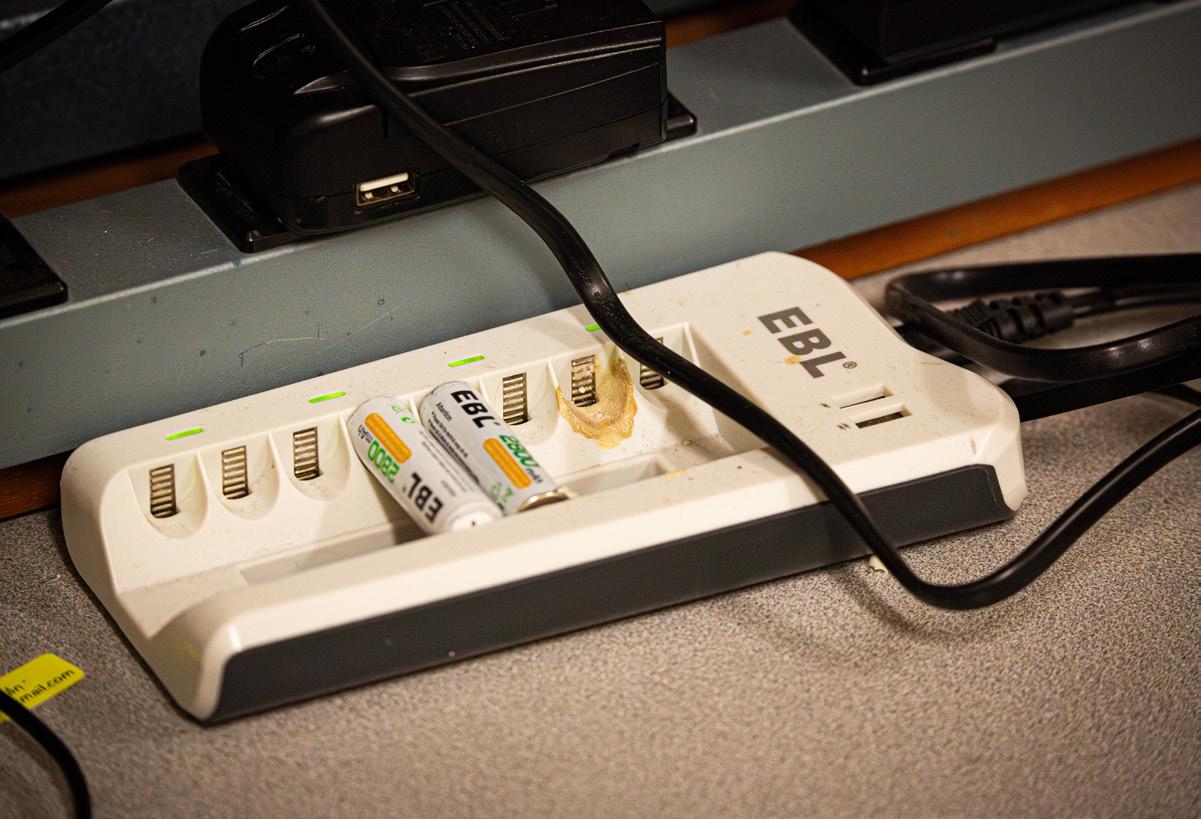

Despite concerns, the love among the film program for each other as students, peers and friends is vast. But, if they had not known that they would meet the friends they have along the way, Cirillo, Angulo, Avalos and Boyer all said that they would choose another school if they could do it over again.
“I didn’t have the money to go somewhere else,” Rodriguez said. “So I would have been stuck here anyways … And if it wasn’t as okay as it is now, then I probably would have not been in this major, I probably would have done something else.”
“I was like, ‘Why am I here? Maybe I should go somewhere else. Even Eastern [Washington University]’ and I’m not even a big Eastern fan,” Avalos said. “But there was a time where I did think about it because it doesn’t feel like the school actually cares about us ... We see that a lot in the favoritism towards the theater department.”
Avalos said that she was skeptical about last year’s merger with the theater department, but held out hope that it could possibly lead to better funding. Avalos, among other students, took issue with the school’s handling of the film department during the recent GiveCentral donation campaign, in which the theater department got $8,000 and the film department got $600.
“I didn’t really think much was going to change, and I was right.” Avalos said. “It definitely pisses me off. I’m not going to benefit from it [because I’m graduating], but it pisses me off for the program and for my friends that are here and that are going to continue … They’re only fundraising for one camera? That’s very pathetic. We need more than one camera.”

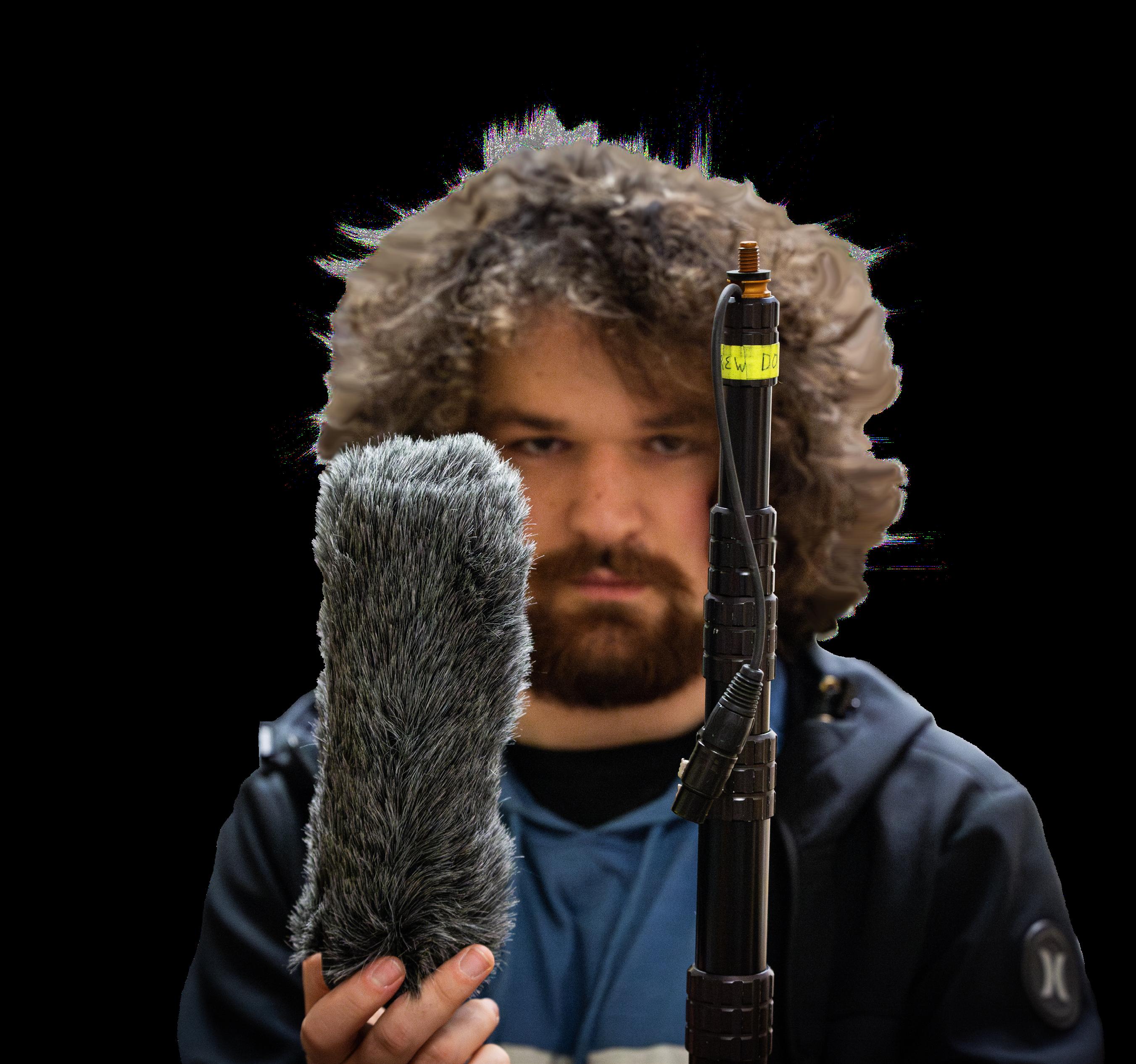

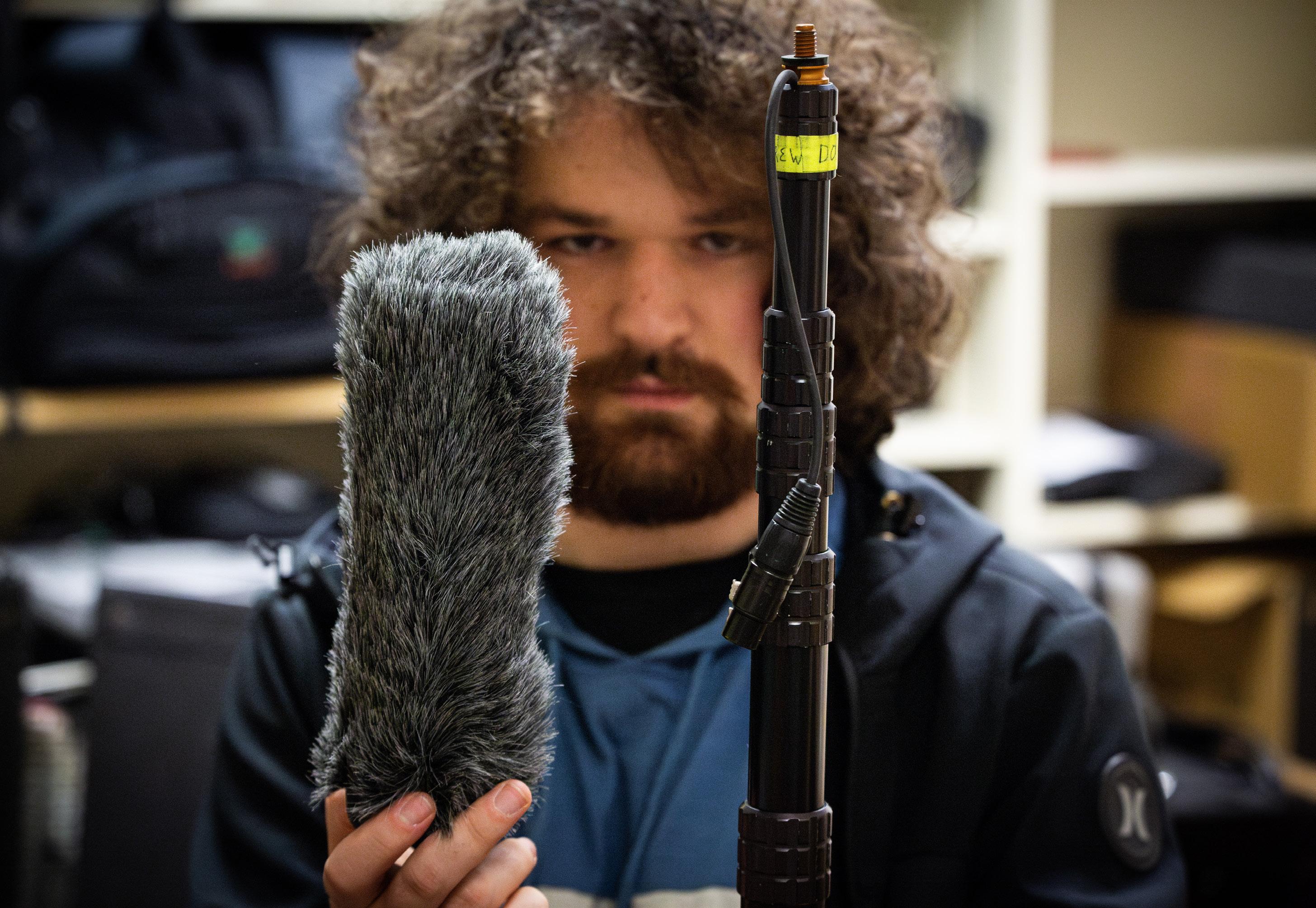


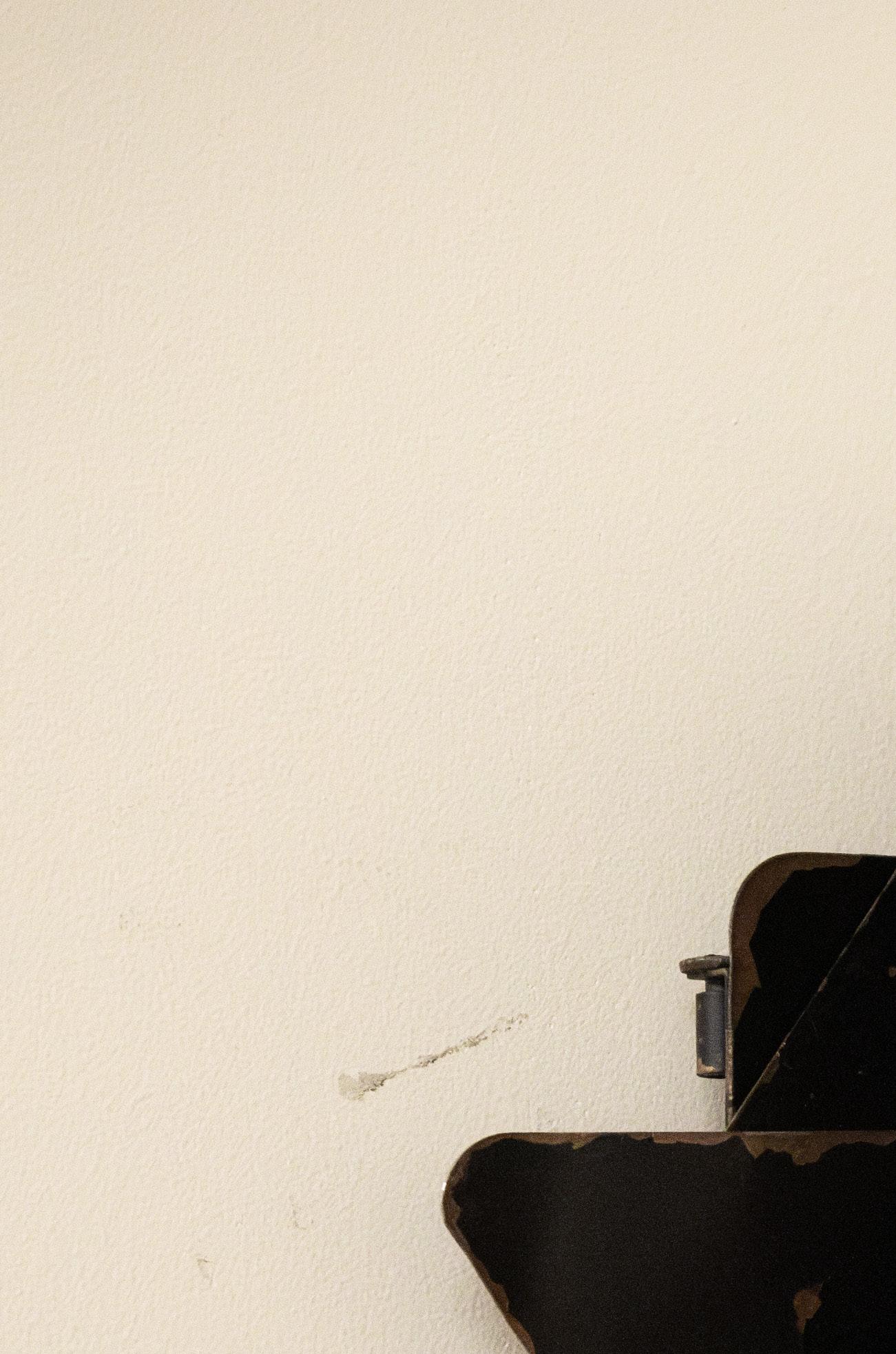
Between three and seven CWU staff employees out of 10 feel overworked, undervalued and exploited, according to a survey by the Public School Employees of Washington (PSE) that Raymond Wells, the president of CWU’s PSE, shared with President Jim Wohlpart on the afternoon of May 9. PSE’s findings call out the low staff morale on campus. In his letter to Wohlpart summarizing the results, Wells explained that the survey was prompted by a letter sent to the provost by Chris Schedler and Pam McMullin-Messier, co-chairs of the Academic Department Chairs Organization (ADCO) regarding the workload of department secretaries and department chairs on April 25.
The letter from Schedler and McMullin-Messier outlines the workload that has been pushed off onto department chairs and secretaries due to vacant positions within their departments. “[T]he added workload, lack of institutional support, and low salary for these positions make it difficult to fill vacancies,” the letter said. “Multiple departments have been working with temporary employees or empty positions, forcing the department chair to assume many of the secretary duties.”
The shared concerns among department chairs and secretaries included taking on the added workloads for vacant positions while receiving no extra compensation, having more responsibilities than can be reasonably expected and having employees in other positions try to assign them more work outside of their actual duties.
“CWU seeks to provide a fair and equitable work environment for all faculty and staff, and we are always looking for ways to improve as an institution,” Provost Patrick Pease said when asked for comment. “With regard to the concerns raised by ADCO, all staff members have a position description, which outlines the duties and responsibilities of their position. These documents are reviewed and updated annually to ensure they stay up to date. During the annual review process, department chairs and support staff perform that work, with support from Human Resources, if necessary. This review process helps us identify shifts in work responsibilities and allows us to ensure that positions and employees are correctly classified.”
The follow-up letter from Wells seeks to address a wider issue among university staff. According to Wells, a recent survey of all PSE members had some telling results. The survey
results detailed that 70% of staff think their position is under-classified, almost 40% are concerned about being illegally targeted for discipline and over 35% say they have received insufficient safety and health training. Half of the responses reported insufficient time for professional development and almost 45% say they can’t afford registration or travel costs for trainings (expenses their departments should be paying). A third of the responses report that they have not been offered the training necessary to perform their jobs. “PSE represents 128 CWU employees, as of the most recent list I’ve downloaded, not all of whom are members,” Wells said.
Short answer questions on the survey also produced what Wells called telling responses, such as one employee who said, “I fear staff positions are not seen as important and are cost savings / easy pickings. We tend to have one person in a pivotal role and then that position is removed yet someone has to take up the slack. There are only so many hours in a day.” Another saying “[I] [a] ssume [the] university will soon try to balance the budget on classified staff’s back while continuing to hire administrators.”
CWU touts statistics from the annual state engagement survey and uses them to highlight successes. However, Wells points out that the connotations of these statistics may not be as positive as they are presented. “77% of respondents felt their immediate supervisor treated them with respect,” the survey showed. This would suggest that nearly a quarter of respondents feel as though their supervisor has disrespected them.
Survey findings also suggest that “69% of respondents felt their immediate supervisor created an environment of openness and trust.” This would mean that close to a third feel their workplace doesn’t foster these qualities. “68% of respondents felt CWU demonstrated commitment to pro-equity and anti-racism (through policies, practices, and actions).” That means that 32% don’t.
A majority of respondents felt positively about their supervisor. “About 66% of respondents agreed that their immediate supervisor was a good leader.” However, the remaining third felt differently in regard to leadership capabilities.
Wells also brought up the issues that secretarial staff were having. “Speaking specifically of the secretaries of academic departments, the recent failures of the Executive Leadership Team to recognize secretaries’ roles to departments’ function with the delay in approving the Art + Design secretary search or to approve individual secretaries
for World Languages and Cultures and Philosophy and Religious Studies has left many of our members disgusted and disheartened,” he said. “These failures demonstrate that the Executive Leadership Team is unaware of the roles secretaries perform in the academic departments at Central or the huge number of duties that have been thrust upon them. One member described this situation to me as treating secretaries (and our members more generally) as interchangeable cogs instead of as people who contribute to the function and learning environment of the university. The idea of one secretary serving two departments has already been tried in the College of Business, leading to the burn-out and departure of the then-incumbent.”
Wells stated that these issues are only made worse by other staff trying to add additional work to the secretaries’ plates, while seemingly having no idea what their actual roles and responsibilities are. More and more responsibilities are being pushed off to department secretaries.
“For at least fifteen of my seventeen years at Central, the university’s motto has not been, ‘by teaching we learn,’ it’s been, ‘do more with less,’” Wells said. “Like an elastic waistband, people can be stretched. Also like an elastic waistband, when we’re overstretched we break, and when we break unfortunate flaws can be exposed.”

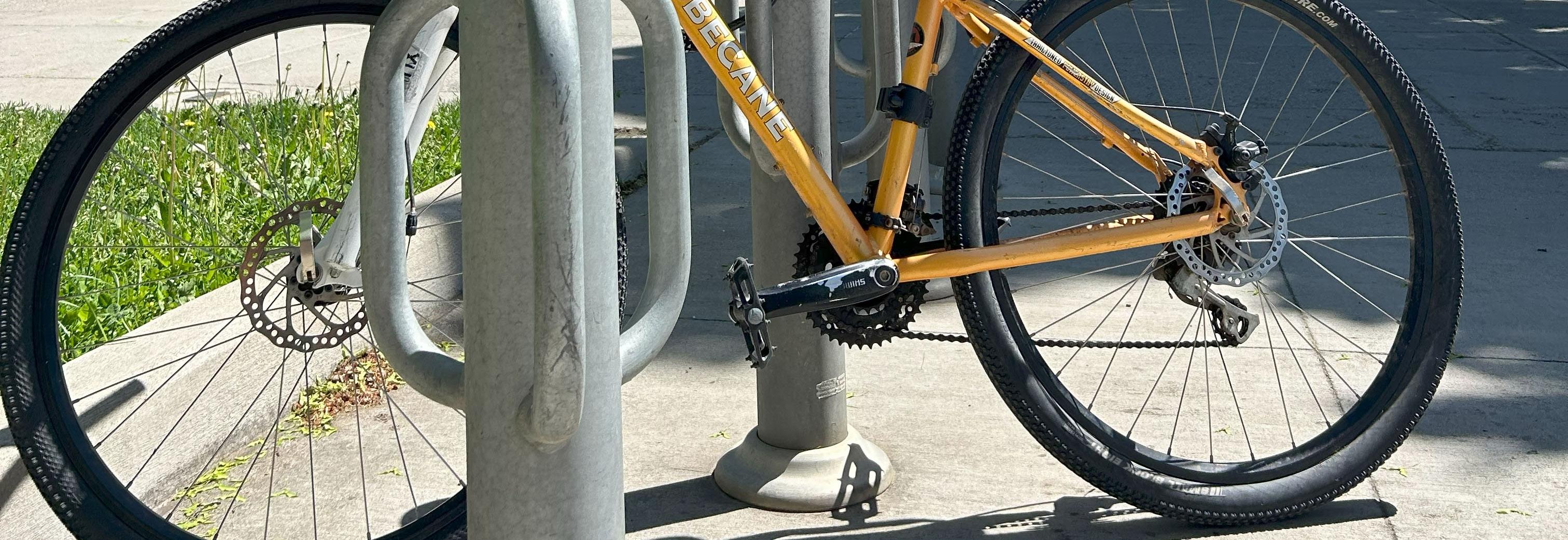 Gabriela Gonzalez Staff Reporter
Gabriela Gonzalez Staff Reporter
The month of May — synonymous with the coming of spring, and in Ellensburg, trips to People’s Pond — is National Bike Month. In celebration, CWU is hosting Bike to Campus Day on May 21 from 8 a.m. to noon. The event is led by CWU’s Sustainability Department in collaboration with Outdoor Pursuits and Rentals (OPR) and the campus police. Bike to Campus Day encourages students, faculty and staff to leave cars in driveways and shake the dust off their bikes when heading to campus. The event is far from two-wheel exclusive, however. “Even though it’s called Bike to Campus Day, it’s kind of more like an alternative transportation day… including if somebody were to scooter or ride their skateboard…” explained Lily De Young, CWU’s Americorps Sustainability Education Program specialist. “We’re really … encouraging people to get outside, to get out of their vehicles and enjoy the sunshine.”
Bike to Campus Day offers more than the obvious step of biking to campus. A tent located directly in front of OPR will provide snacks and refreshments throughout the morning. Thrill-seeking students
should also be sure to visit the wheelie station where the back wheels of bikes are mounted to the ground to allow for wheelie practice. CWU Sustainability also plans to set up a satellite location on south campus where the campus police will be stationed. Campus police can share bike safety information as well as assist with registering bikes with the National Crime Information Center (NCIC). In the event a bike is stolen, NCIC can assist with relocating and returning bikes.
Bike rider enthusiast and environmental science major junior, Lexie McCoy, shared her motivations for choosing biking as her primary mode of transportation. “For me, riding my bike is a lifestyle — not a one day thing,” she said. “I like riding bikes because it’s less expensive, healthier, and more fun. It feels freer and I’m able to appreciate my surroundings better.”
Andrew Lapora, a junior accounting major, felt similarly. “I bike to class for both the health benefits, of ya know, getting out and moving because it’s important, and also because it saves on gas, and I like that,” Lapora says.
Events like Bike to Campus Day build community and spark positive lifestyle changes. For questions related to Bike to Campus Day, contact Sustainability Officer Jeffrey Bousson at jeffrey. bousson@cwu.edu. More information related to



The path to leadership can come in many forms, whether honed through multiple experiences or just out of a call to serve the community. For Charles Johnson, a junior in the business administration major and ASCWU presidential candidate, the calling came because he felt he could help. While he currently serves as Senate Speaker, Johnson feels that he can do more for CWU and believes that the presidency is key to helping facilitate these goals.
The biggest thing that drew Johnson to positions of leadership was the community. “I’ve always had a deep care for the people that are around me and especially in my community,” Johnson said. “Seeing where there are areas for improvement that aren’t being met… and making sure that someone is advocating for those people.” Johnson added that this was what drove him to join the student senate as senator of the College of Business, which eventually led to his current position as senate speaker.
After spending some time at CWU and getting to know campus, this drive to serve the community brought Johnson to the Student Senate, where he currently serves as senate speaker. In this position, Johnson has been able to facilitate many conversations in regard to improving things at CWU. “I’ve been making a lot of headway in the work that I’ve been doing and taking part in conversations around campus safety, worker safety, online class reform and making sure that student standards for their education are being met,” Johnson said. However, while progress is being made, Johnson feels that the best way he can continue to keep up the progress is via the position of ASCWU Pres-
ident. “I do this not for the name of the position, not for the job title, but I do it because I have a deep-rooted care for the people in my community and a deep-rooted care for the students of Central.”
Many of the issues Johnson hopes to tackle as president are geared towards making sure students have the best learning environment they can, including the aforementioned campus safety and online class reform. However, Johnson also has eyes on other ongoing situations around CWU, such as the renovation of Black Hall, the establishment of a multicultural center, the rights of student workers and becoming a Hispanic-Serving Institution. “My heart truly lies with the students and with my community,” Johnson said. “I want to be able to be there for them and advocate for them the same way I’ve already been doing.”
Johnson also mentions that he has other skills that are key to being a strong leader, such as a desire to stand up for others despite possible pushback. “I’m not afraid to tell administration when they’re wrong and that they’re not listening to students, and I’m not afraid to be the loudest student in a room full of faculty screaming at the top of my lungs for the needs of students,” Johnson said.
Johnson also feels that the skills he’s learned in his major will serve him well in the presidency. “I’m taking a class right now called principles and management, where all we talk about in that class is how to be a leader, the different styles of management, how to work with your team, how to work with individual personalities,” Johnson said. He also states that he’s spent time cultivating skills such as budgeting, which is important to lead-
ing the charge on initiatives. “A lot of my skills that I’ve acquired as a business major have directly translated into my work because ASCWU, even though it’s student government and student advocacy, it still runs similarly to how a business would,” Johnson said. However, there is another perspective that Johnson has on leadership which may surprise some, as it’s geared towards restraint and knowing when to ask for help. “It’s also really important as a leader to be able to say [that] I’m not the most learned in this area, I don’t have that expertise on how to handle that,” Jonson said. He emphasizes that nobody is capable of having the best answer to everything, so he plans to surround himself with a strong team that can help him make informed choices and learn from them.
In ten years time, with college long behind him, Johnson feels that one of his career paths could be in advertising, where he would work with companies on their campaigns. Alternatively, though, corporate law is another place he could see himself working. “I’ve always had an eye for business, and I’ve always had an interest in business and being in corporate America because I feel like there’s a lot of improvement that can be made there and a lot of corruption that needs to be solved,” Johnson said. In either case, Johnson knows that the business world is in his future, but he wants to make positive changes in that world, such as making it more consumer-friendly and improving the way they’re treated in the corporate landscape. Johnson is aware that such a thing is no simple task, but he’s unfettered by this. “I know I’m one small person, but I think that one person can make a lot of change,” Johnson said.
(Photo by Jakob Burnham)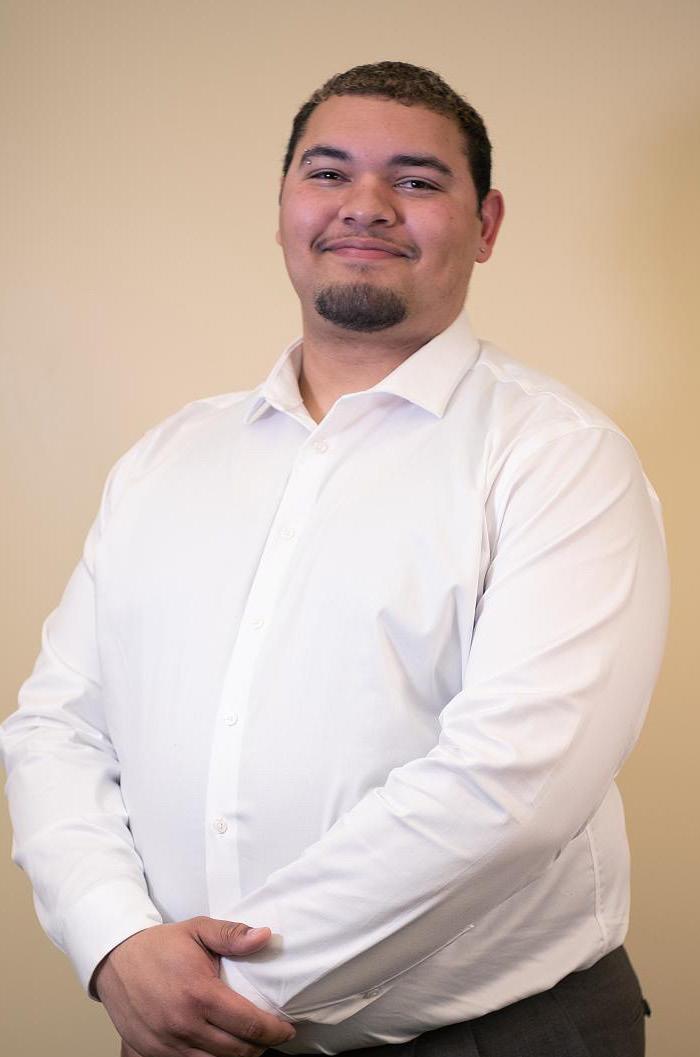
On Monday, April 29 and Tuesday, April 30 the Wildcat track & field team competed at the Great Northwest Athletic Conference (GNAC) Outdoor Multi-events Championship Tournament in Bellingham, Washington.
It was here that junior multi-event athlete Drew Klein claimed his crown in the men’s outdoor decathlon as he walked away with 6709 total points overall. Other top performers from this meet included freshman sprinter Emy Ntekpere, junior hurdler Carly Huber and multi-event athlete Ellie Degroot.
“I train everywhere,” Klein said. “I train cardio, strength in the weight room, speed because I have to be fast [and] flexibility because I need to be flexible for each event.”
Klein claimed first place in four of the 10 events he competed in during the championship including the 100 meter dash with 11.17 seconds, long jump with 6.96 meters, pole vault with 4.73 meters and discus with 35.58 meters.
“If you’re not prepared and confident in your ability to even produce high level marks that could turn into a conference championship win, then I think you [have] got to start working harder,” Klein said.
pere placed fourth in the heptathlon with an overall score of 4335 points and Huber placed sixth with 4011 points.
“I’m still a little disappointed in myself because [during] indoor season, I did do better than I am doing right now,” Ntekpere said regarding her recent performance. “But I am still proud of myself that I am doing my season’s best, that I can still get up there.”
Huber added her take on the tournament and pointed out what went well for her.
“I like being able to know that we helped out our team with getting us points and really starting off on a good foot going into the individual events this Friday and Saturday [May 10 and May 11],” Huber said. And it was a really awesome atmosphere to be able to do it with other heptathletes and our decathletes.”
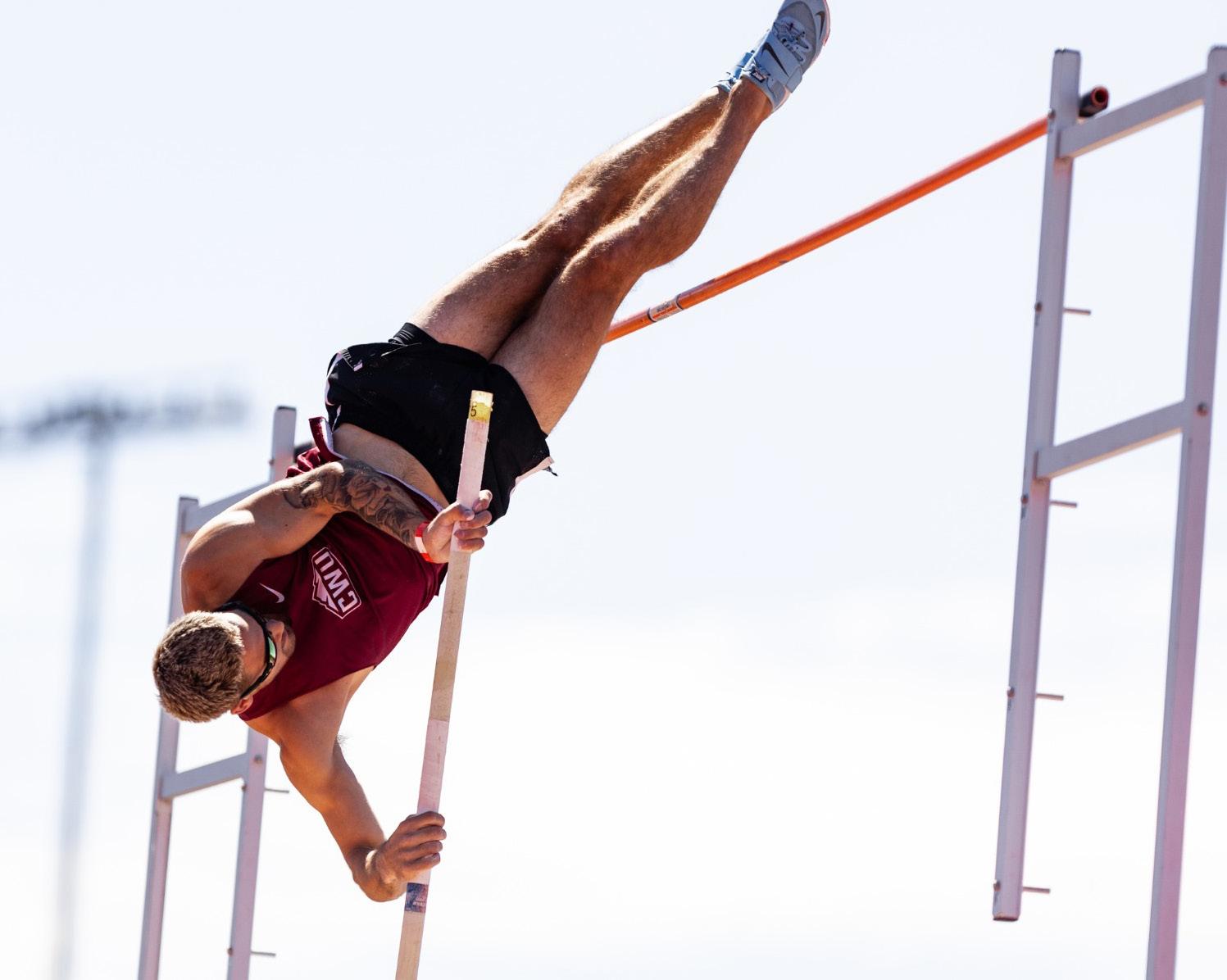
While Degroot suffered an injury during the meet, she took charge on the first day of the tournament as she won the women’s 100 meter dash event with 14.47 seconds and the 200 meter dash with 25.37 seconds.
Ntekpere and Huber broke their previous personal bests at the tournament as well. Ntekpere won first during her high jump event with 1.72 meters and Huber won the 800 meter event with a time of 2:27.80. Ntek-

On Friday, May 10 and Saturday, May 11, CWU took on the GNAC Outdoor Championship Tournament that was hosted here on campus in Ellensburg, Washington. The Wildcats performed well as both the men’s and women’s teams placed second overall, earning a collective 28 medals, achieving 24 new personal records, attaining six new school records and breaking a GNAC record. There were also two individual meet awards presented to Klein as the Men’s Field Athlete of the Meet as well as freshman sprinter Josh Green as the Men’s Track Athlete of the Meet. Klein, Ntekpere, Huber and Degroot came to play again for this tournament as they each earned at least
one medal in their respective events. Klein garnered two bronzes and a gold medal, Ntekpere achieved a gold and a silver medal, Huber finished with a bronze medal and Degroot obtained a silver medal.
Another decorated athlete of the weekend was sophomore sprinter Isaiah Webster as he received medals in numerous events such as the men’s long jump, triple jump and high jump.
Both the men’s and women’s 4x100 meter dash teams were able to place first with times of 40.88 seconds and 45.76 seconds respectively. The men’s time was enough to beat their previous GNAC record and the women’s time prevailed as a season best.
Fifth-year thrower Brenna Board showed out for women’s shot put as she placed fifth overall and then came back for discus and snagged second place with a season best of 41.19 meters. “I’m excited because I did place a little bit higher than I was ranked, coming in,” Board said about her placement. “I’m just hungry.”
Freshman thrower Wes Kriete had a feeling that big things may be coming his way in his men’s shot put event as he seemingly predicted his own personal record.
“Lately I’ve been throwing fifteen [meters], fifteen-fives but I’ve been working on stuff in practice,” Kriete said. “Sixteen is looking pretty strong.” Not only did Kriete set a new personal record at 16.04 meters for men’s shot put, but his throw also earned him a gold medal for the event.
Kriete stated that his next prediction was to reach the national tournament next year, but only time will tell if this will prove as correct as his shot put distance.
As there were many standout performances over the weekend, only a few were highlighted above and the full list of players that earned achievements can be found by scanning the QR code below.
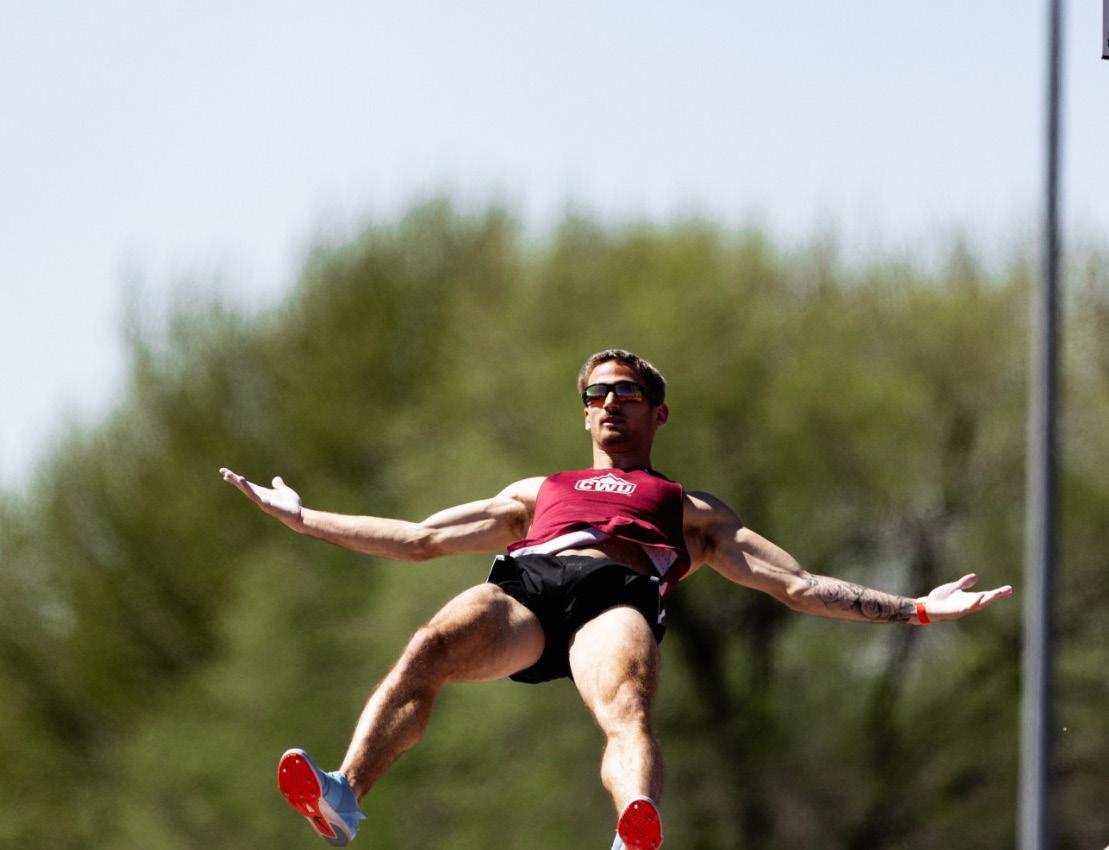




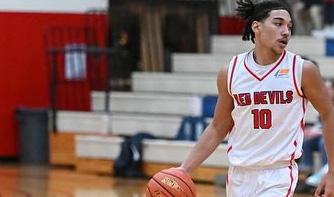
Following a 2023-2024 season where the men’s basketball team won the Great Northwest Athletic Conference (GNAC) Tournament, CWU will lose many key contributors due to graduation. The Wildcat’s future is not in jeopardy though with five new players committed to the university for the upcoming season.
Three of the five signings made were players who have previous collegiate basketball experience.
One of the players who committed to CWU out of high school is Eli Williams. Williams, standing at 6-foot 4-inches, came from North Central High School, in Spokane, Washington. During his highschool years he brought his team to their first state appearance since 2011 and their first district championship in 32 years.
The other high schooler was Jamari Harris who is 6-foot 5-inches and out of Garfield High School in Seattle, Washington. Harris is a very athlet
ic two-way guard who can help the Wildcats on both sides of the floor.
Kobe Parlin is a 6-foot 2-inch guard and will be someone to watch next season to bring lots of scoring in his transfer to CWU. Coming off his freshman season he averaged 17 points per game at Lower Columbia College and was a key part in them winning the West Region Championship.
Parlin felt there were many things that CWU provides to help him as a player and as a student, and he’s looking forward to getting better. “I really like the facilities for academics and athletics,” Parlin said. “I felt like I fit in very well with the team and it was easy to mesh with everyone. I am very excited to play along[side] these guys. Also I heard CWU has one of the best atmospheres in the GNAC and I am excited to find out.”
The next commitment was Calvin Sisk who will bring a height advantage for the Wildcats as he stands at 7-foot 2-inches. Sisk went to North
Dakota State College of Science where he averaged 11 points per game and seven rebounds. He was also a key contributor in getting his team a region championship.
Sisk said he joined CWU because when he visited it felt like home. He is looking forward to getting CWU another GNAC championship and getting farther into nationals. “I’m very excited for this season, it’s a young team but we are very hungry and I like what they can do on the floor and I’m excited to be a part of it,” Sisk said. “I will bring a lot of rim protection on defense and will bring a lot of running the floor on transition and finishing around the rim.”
Head coach Brandon Rinta expressed excitement about the turnout of the recruiting class and is looking forward to seeing them fit in with the returning players. Rinta also talked about what it’s going to take for the team to do to defend their GNAC title with key seniors leaving the roster this past season.
“First, we are going to need to establish leadership early on,” Rinta said. “Second, we will need to be one of the best defensive teams in the conference. It takes consistency to win championships and the one thing you can have control of every time you step on the court is your level of effort and focus on the defensive end.”
While the basketball season is far from starting, these new recruits will have plenty of time to get attuned with the culture here at CWU and work on keeping the GNAC trophy in Ellensburg.

The final commitment so far was 6-foot 9-inch sharp shooter Dallon Morgan out of Eastern Arizona College (EAC). He averaged nine points per game and five rebounds per game as well as making 64 three pointers on the year. EAC was able to win their region championship with the help of Morgan as well.

“I’m very excited for this season, it’s a young team but we are very hungry and I like what they can do on the floor and I’m excited to be a part of it,”
- Calvin Sisk


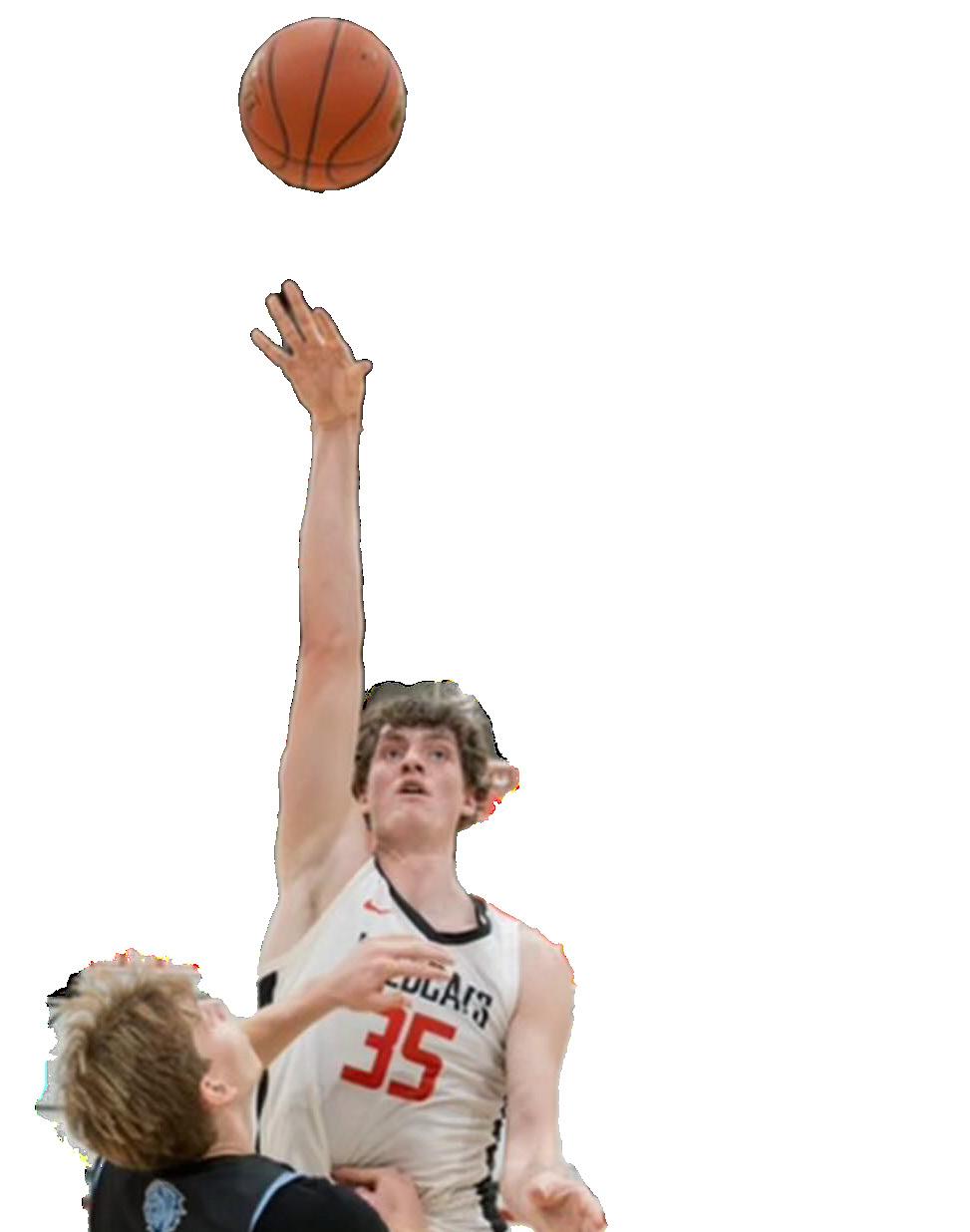


What a wonderful day!” as the main antagonist Proximo Cesar once put it in this latest installment in the “Planet of the Apes” franchise. “Planet of the Apes” has been an extremely long running franchise since the first film’s release in 1968, based on the best selling titular novel by Pierre Boulle.
“Kingdom of the Planet of the Apes” takes place roughly 200 years after the events of “War for the Planet of the Apes.” Human civilization is now gone, leaving nothing but remnants of human monuments, reclaimed by nature. The film follows Noa, a young chimpanzee, who lives peacefully with his tribe of apes until a group of outsider apes invade Noa’s village and capture all of his friends and family.
Now with nothing left Noa must find his tribe and bring them home. The first act of this film is very well paced with a lot of thought and effort being put into world building and the overall character development of Noa. However this nice pacing and character work is quickly thrown aside at the very start of the second act, where the rest of the film just tries to copy the “War for the Planet of the Apes” storyline. Leading to this film to probably be the most polarizing film for me in the entire “Planet of the Apes” franchise.
As I’m sure all of you have already guessed by now but I am a huge “Planet of the Apes” fan. Ever since my uncle showed me “War for the Planet of the Apes” for the first time I’ve been obsessed with this franchise. With me probably going as far as saying that “Planet of the Apes” is my favorite franchise in all of cinema. So you could imagine my excitement when I first heard about this movie two years ago.
The main antagonist of the film, Proximo, is extremely well written and acted, to the point where he almost becomes e other characters and that apes should be able to just expand. An ape that is inspired by human Roman history is a really cool idea but I swear he has like seven minutes of screentime.

The standout character in the movie to me is unsurprisingly the religious orangutan, Raka. Raka is the perfect mentor character for Noa, with his awesome design and overall personality he really does shine as the best character.
“Kingdom” has a ton of heart and passion put into it but it fails to uphold the philosophical standards that this franchise has established since its first inception. The Computer Generated Imagery (CGI) is very good, although some parts would be a little too choppy. But the setting is intriguing enough to help audiences get more familiar with the movie’s setting. Owen Teague is a very promising young actor and I look forward to seeing him in more things. With that, “Kingdom of the Planet of the Apes” gets three and a half potatoes.
Student loan debt, like a towering mountain looming over the dreams of countless young individuals, has entrenched itself as a formidable barrier to accessing higher education and achieving financial stability. Its impact is not just financial, but deeply personal and psychological, casting a shadow of anxiety and uncertainty over those who dare to pursue their dreams of a better future. This is the story of the profound impact of student loan debt and my belief is that shedding light on its challenges and consequences is not just important, but urgent.
As a witness to the struggles and sacrifices made by my friends, family and peers burdened by the weight of student loan debt, I have seen firsthand the toll it takes on their well-being and aspirations. The burden of debt follows them like a dark cloud, dictating their choices and limiting their opportunities. It forces them to navigate a treacherous path of financial insecurity, perpetually grappling with the fear of default, late payments and the looming specter of a credit score haunted by the shadows of missed opportunities.
The consequences of student loan debt goes far beyond the individual, creating a ripple effect that impacts families, communities and society at large. Graduates saddled with significant debt postpone major life milestones, such as buying a home, starting a family or pursuing advanced degrees, as they struggle to make ends meet and service their debt obligations. The psychological toll of this burden is immense, eroding confidence, stifling ambition and dampening the once-burning flame of hope and possibility that education is meant to ignite.
Throughout this narrative, my determination compels me to unravel the enigma of student loan debt and reveal effective solutions that could reduce its burden. It is not only a matter of economic sense but also a moral obligation to question the conventional practice and support transformation that enables people to follow their aspirations without being confined by debt shackles.
One potential solution lies in financial literacy and education. By equipping students with the knowledge and tools to make informed decisions about borrowing, budgeting and managing debt, we can empower them to navigate the complex terrain of student loans with confidence and foresight. Education is not just about filling minds with knowledge but also arming individuals with the skills and awareness to navigate the financial landscape and make sound choices that will shape their future. Moreover, we must advocate for policies that promote affordability, access and equity in higher education. This includes measures such as increasing funding for public colleges and universities, expanding needbased financial aid and implementing tuition reduction. By addressing the systemic issues driving the rise of student loan debt, we can create a more just and inclusive education system that ensures every individual has the opportunity to pursue their dreams without being shackled by debt.
In addition, supporting actions that prioritize loan forgiveness for those in public service, healthcare, education and other vital fields can provide a lifeline to those burdened by debt. By recognizing the invaluable contributions of these individuals to society and offering them a path to financial relief, we not only alleviate their burden but also invest in a brighter and more equitable future for all.
As I navigate through the complex maze of student loan debt, I am driven by the conviction that shedding light on its challenges and repercussions is more than just advocating - it is a call to take action. It serves as an urgent appeal to challenge the existing norms, rewrite the narrative surrounding debt and forge a future where education becomes a symbol of optimism and possibility for everyone. By exploring potential remedies, advocating for transformation and standing united with those burdened by debt, we can convert the shadows of despair into beams of hope, paving the way for a brighter future free from the chains of debt for generations to come.









Welcome to this week’s issue of Sound Bite! This week Donald Glover dropped his latest album under his persona Childish Gambino. The album, titled “Atavista,” is a finished version of his 2020 release “3.15.20” which features artists ranging from 21 Savage to Ariana Grande.
The album definitely tends to lean toward a more R&B-influenced funk work than anything else, with a few songs such as “Final Church” and “Little Foot Big Foot” serving as major standouts. The six-plus minute track titled “Psilocybae” is definitely the most hip-hop inspired, but even then it leans back into the funk origins of the previous work.
The album rollout was a unique one, with Glover using his site/ station “Gilga Radio” as the main source for teasers and updates. The latest episode featured a music video as well as a variety of satirical AI advertisements from the likes of Donald Trump and DJ Akademiks. Recently he also announced the tour dates for his latest tour, “The New World Tour,” and he also announced that his next album is dropping sometime this coming summer season.
In other music news, Eurovision seems to be making headlines this week for a variety of reasons. Many people protested the venue due to its inclusion of Israeli artists amidst the country’s ongoing war. While controversial, nothing really impacted Eurovision as the competition and fans were still adamantly watching this year’s song contest.
Rapper and singer Nemo took home the official win in this year’s song contest for their home country Switzerland. The win is already being paraded by fans as this marks a major win for the LGBTQ+ community in terms of music and its boundaries.
Columnist
“Video Games 2”Snow Strippers, PurpleSparklyBentley
This track is sorta a remix of that Lana Del Rey song but with a muddy house beat and vocals that get you more turnt than soothed. That last verse is heavenly too.
“Clean Heart”Sade
eMy favorite Sade song comes back into the rotation when the sun starts setting late.
“RED CROSS”Bladee
Hard af. Shoutout to some of the bars on this too. “Our reality is blue- berry flavored,” “Hoodie on, I’m a civilian, Oakleys on like a Brazilian,” and “Crocodile Dundee, alligator skin all over me,” are too fun not to mention.
“Dirty Plug”Ricky Chix, Laker, woody Summer means plugg music! And the woody feature… Bro…









to
- Hues of
Outside of the
All Day - Don’t Waste, Donate: Donation Collection - Around campus First Day of Student Appreciation Week

4 to 6 p.m. - Presentation Palooza: Brooks Library 152 5 to 8 p.m. - Faculty Recognition Ceremony: SURC Ballroom 9 to 11 p.m. - MMM: “Shrek”


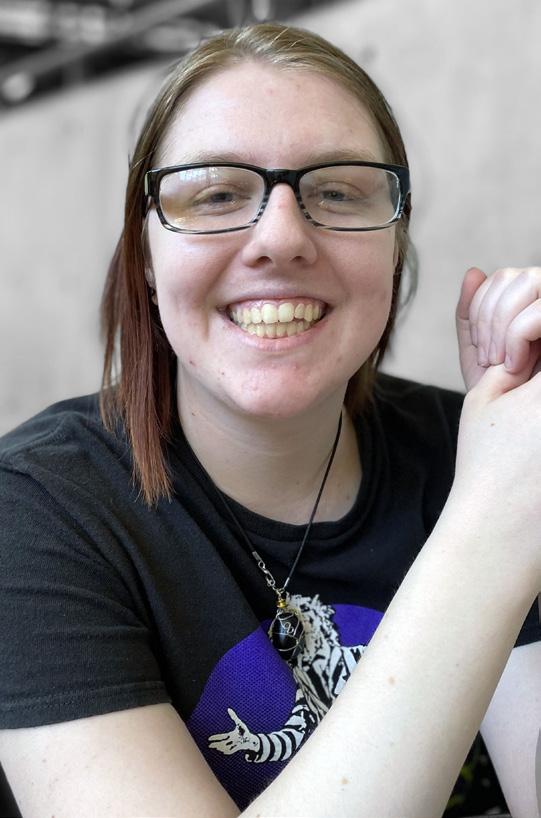

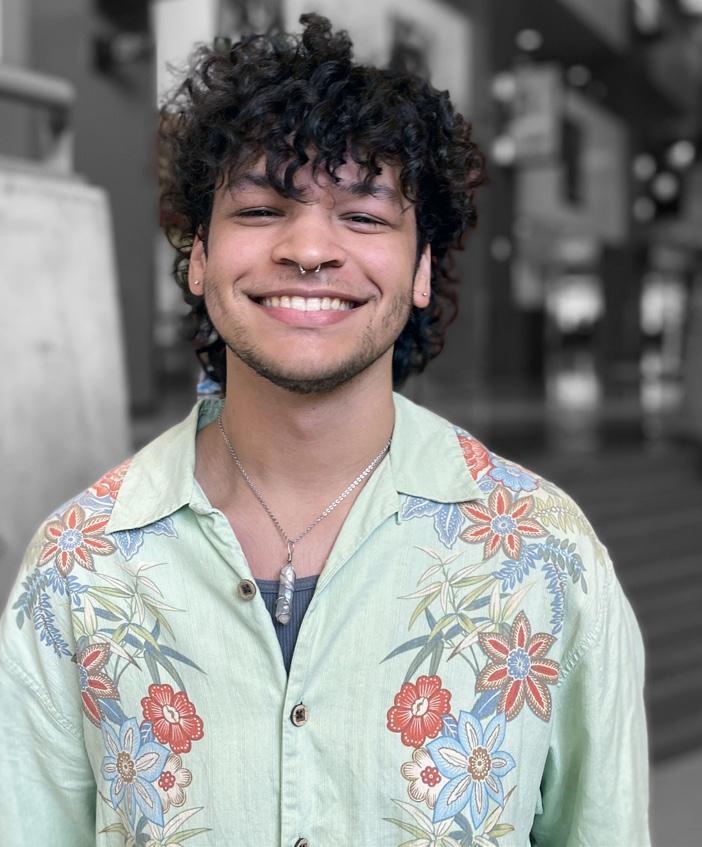

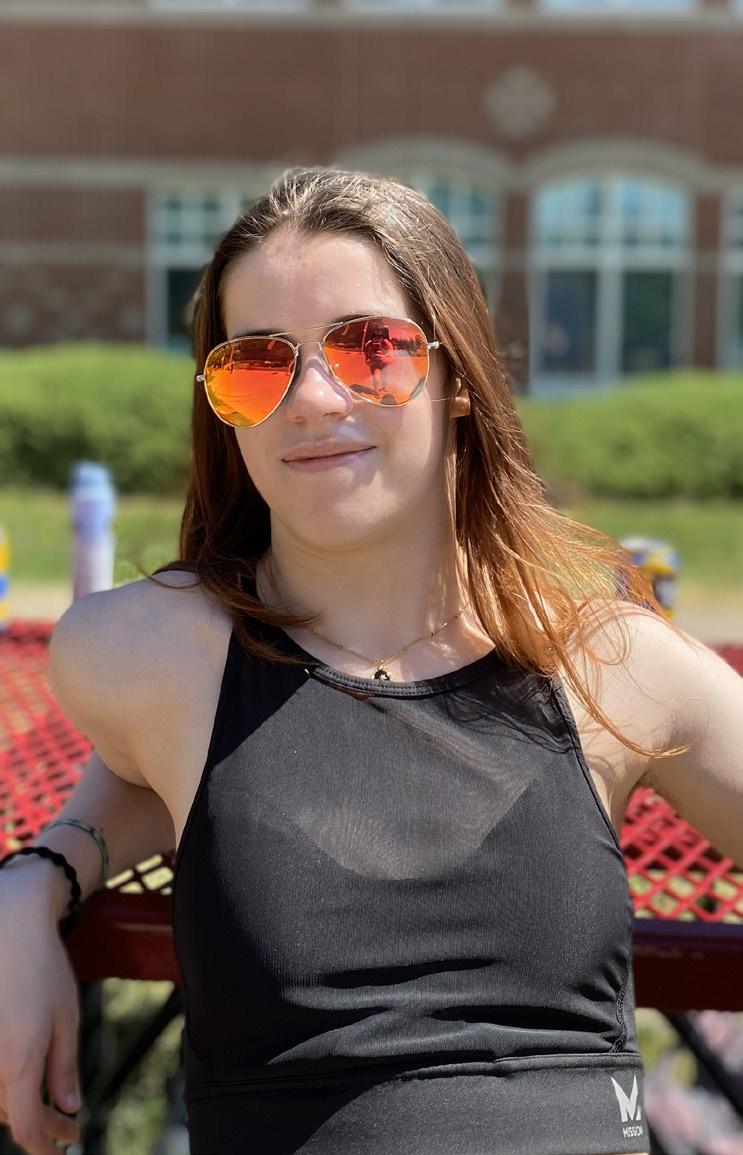
On May 14, anti-abortion protestors stood in front of the SURC and handed out pamphlets. They held large print posters of graphic images that had no pertinent relevance to their anti-abortion statements. Jan Tilley, sophomore English professional and creative writing major, chose to hold their own “counter-protest.”

Can you tell me a bit about what you’re all doing out here?
“I saw the anti-abortion people loading up and getting ready and was like ‘These people have an effect on the people on campus.’ They lower morale. The pictures they have psychologically hurt people. There are pictures of blood gore up there, and they lie. So, I decided, I have a large amount of cardboard boxes in my dorm room. I don’t have markers, I have the boxes. I’ll get a friend who has markers, I’ll make some signs and I’ll come out here. Came out here, and we’ve just been amassing people since then.”
How much have you seen the anti-abortion protestors on campus?
“This is the second time I’ve seen them here. They came here last year around this time. I joined the counter-protest then, too. This year, there’s a lot more of them, and they have a lot more signs. They’re up by my dorm, I can’t even walk to my dorm without being talked to by them. And I’m like, they try to ‘ma’am’ me, and I ain’t a ma’am! And I was like, okay, you can only ignore them for so long, might as well make a stand against them. They aren’t even protesting. There’s nothing here for them to protest, they’re just showcasing their beliefs. We’re the ones actually protesting them because they’re the ones affecting people on campus.”
How do you think protests like this one will help you further your personal goals and career goals?
“Career goals, I’m not sure. My career is still a bit up in the air, I will admit. I’m a writing major, we don’t exactly have career goals. But, personal goals, I want campus to be a safe place. I’ve met a lot of people who are more like me on this campus, and I want it to be safe for them. There was someone here earlier who walked down here crying because of the things that people were saying to them, and I don’t think that’s okay. Freedom of speech aside, this isn’t freedom of speech. This is trying to psychologically hurt people, and that’s abusing a right. I’m trying to take a stance.”
What is it about this campus that makes you feel comfortable to protest and/or makes you want to protest for it?
“I’ve realized a lot of people on campus, despite this being Ellensburg, in the middle of rural Washington, most people on this campus are okay with this kind of thing. And, someone has to start it, and if nobody else is gonna start it, I’ll go ahead and do it, and I’ll just get people to come with me. I got Kay, one of the other people around here, to just come and join me. And we made signs, came out here, met some of the people and we’ve just been amassing people ever since.”
What, to you, is success?
“Feeling fulfilled in life.”

